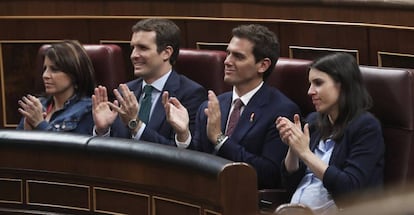Citizen concern over state of Spanish politics at highest since 1985
According to the latest Centre for Sociological Research poll, 40% of voters would cast a ballot for the Socialist Party at a fresh election, with support for left-wing Unidas Podemos falling


Politicians and political parties are considered one of the biggest problems facing Spain, according to the June survey from the Centre for Sociological Research (CIS). The poll found that politicians rank behind only unemployment on the list of Spaniards’ concerns. Almost a third of those interviewed – 32.1%, four percentage points more than in May – say they are worried about the country’s politicians. This is the highest level since 1985.
The crisis has eased, we have had five years of strong growth, but unease over politicians has not stopped growing
Researcher José Pablo Ferrándiz
The results come as political deadlock in Spain continues to deepen, more than two months after the April 28 general election. Although acting Prime Minister Pedro Sánchez, of the Socialist Party (PSOE), has set a date for an investiture vote, he does not currently count on the necessary support from other political parties to be voted back into office by deputies in Congress. One of the main stumbling blocks has been the political stalemate between the Socialists and the left-wing anti-austerity group Unidas Podemos, whose 42 votes are needed to ensure Sánchez’s investiture bid is successful.
Up until a decade ago, around 10% of Spaniards were concerned about politicians but this figure began to rise in the middle of 2009 during the financial crisis. Since then, the downward trend has continued.
According to the June results, almost two-thirds (62.5%) of Spaniards say unemployment is the biggest national problem, followed closely by politics.
Political discontent reached similar peaks (above 30%) on two occasions in 2012 and 2013, just before the emergence of new political parties. After the repeat general elections of 2016, concern over politicians began to rise again until reaching the historic level in June.
“In the middle of the economic crisis, discontent with politicians was associated with cuts and the questionable management of the Great Recession. But the crisis has eased, we have had five years of strong growth, and unease over politicians has not stopped growing. The main reason is the paralysis that has petrified Spanish politics in recent years,” says José Pablo Ferrándiz, a researcher with the polling company Metroscopia.
Up until a decade ago, only around 10% of Spaniards were concerned about politicians
The arrival of the center-right party Ciudadanos (Citizens) in 2006, which was founded in response to the Catalan independence drive, and Unidas Podemos, which was created in 2014 in the aftermath of the 15-M citizen protest movement, fractured Spain’s two-party political system, making it more difficult for a single group to form a government. The rise of the far-right party Vox has further splintered the system, meaning political parties are increasingly forced to negotiate deals if they are to govern. But this can lead to political deadlocks, which, according to political scientist Pablo Simón, gives the “impression of a loss of efficiency in the political system.” Simón adds that the historic level of political concern is also related to the increasingly polarized nature of Spanish politics.
“The terrible perception is due to the economic crisis, which set the level of concern very high and it has remained there for a long time, combined with more circumstantial factors such as the inability to resolve the Catalan crisis, corruption cases, and above all, over the past weeks, the noise and instability of Spanish politics,” says Ignacio Jurado, from York University, referring to the failed negotiations ahead of the investiture ceremony.
Spain could be heading to new elections if Sánchez cannot secure the necessary support from other political parties. According to the CIS survey, if new polls were called, his party would achieve the best result, winning 39.5% of the vote. Ciudadanos would come in second place with 15.8%, followed by the right-wing Popular Party (PP) with 13.7%, Unidas Podemos with 12.7% and Vox with 5.1%, according to the voter-intention survey.
The poll shows that Unidas Podemos would be worse off if new elections were called, losing more than 1.5 percentage points from the April results, a factor that may sway negotiations with the Socialists.
English version by Melissa Kitson.
Tu suscripción se está usando en otro dispositivo
¿Quieres añadir otro usuario a tu suscripción?
Si continúas leyendo en este dispositivo, no se podrá leer en el otro.
FlechaTu suscripción se está usando en otro dispositivo y solo puedes acceder a EL PAÍS desde un dispositivo a la vez.
Si quieres compartir tu cuenta, cambia tu suscripción a la modalidad Premium, así podrás añadir otro usuario. Cada uno accederá con su propia cuenta de email, lo que os permitirá personalizar vuestra experiencia en EL PAÍS.
¿Tienes una suscripción de empresa? Accede aquí para contratar más cuentas.
En el caso de no saber quién está usando tu cuenta, te recomendamos cambiar tu contraseña aquí.
Si decides continuar compartiendo tu cuenta, este mensaje se mostrará en tu dispositivo y en el de la otra persona que está usando tu cuenta de forma indefinida, afectando a tu experiencia de lectura. Puedes consultar aquí los términos y condiciones de la suscripción digital.








































